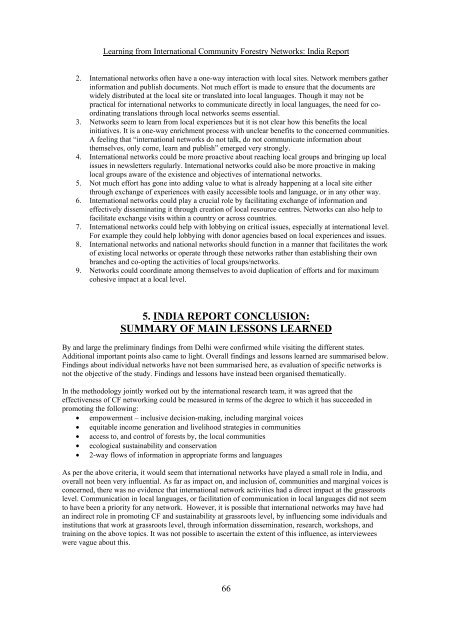Snapshots of International Community Forestry Networks: Country ...
Snapshots of International Community Forestry Networks: Country ...
Snapshots of International Community Forestry Networks: Country ...
You also want an ePaper? Increase the reach of your titles
YUMPU automatically turns print PDFs into web optimized ePapers that Google loves.
Learning from <strong>International</strong> <strong>Community</strong> <strong>Forestry</strong> <strong>Networks</strong>: India Report<br />
2. <strong>International</strong> networks <strong>of</strong>ten have a one-way interaction with local sites. Network members gather<br />
information and publish documents. Not much effort is made to ensure that the documents are<br />
widely distributed at the local site or translated into local languages. Though it may not be<br />
practical for international networks to communicate directly in local languages, the need for coordinating<br />
translations through local networks seems essential.<br />
3. <strong>Networks</strong> seem to learn from local experiences but it is not clear how this benefits the local<br />
initiatives. It is a one-way enrichment process with unclear benefits to the concerned communities.<br />
A feeling that “international networks do not talk, do not communicate information about<br />
themselves, only come, learn and publish” emerged very strongly.<br />
4. <strong>International</strong> networks could be more proactive about reaching local groups and bringing up local<br />
issues in newsletters regularly. <strong>International</strong> networks could also be more proactive in making<br />
local groups aware <strong>of</strong> the existence and objectives <strong>of</strong> international networks.<br />
5. Not much effort has gone into adding value to what is already happening at a local site either<br />
through exchange <strong>of</strong> experiences with easily accessible tools and language, or in any other way.<br />
6. <strong>International</strong> networks could play a crucial role by facilitating exchange <strong>of</strong> information and<br />
effectively disseminating it through creation <strong>of</strong> local resource centres. <strong>Networks</strong> can also help to<br />
facilitate exchange visits within a country or across countries.<br />
7. <strong>International</strong> networks could help with lobbying on critical issues, especially at international level.<br />
For example they could help lobbying with donor agencies based on local experiences and issues.<br />
8. <strong>International</strong> networks and national networks should function in a manner that facilitates the work<br />
<strong>of</strong> existing local networks or operate through these networks rather than establishing their own<br />
branches and co-opting the activities <strong>of</strong> local groups/networks.<br />
9. <strong>Networks</strong> could coordinate among themselves to avoid duplication <strong>of</strong> efforts and for maximum<br />
cohesive impact at a local level.<br />
5. INDIA REPORT CONCLUSION:<br />
SUMMARY OF MAIN LESSONS LEARNED<br />
By and large the preliminary findings from Delhi were confirmed while visiting the different states.<br />
Additional important points also came to light. Overall findings and lessons learned are summarised below.<br />
Findings about individual networks have not been summarised here, as evaluation <strong>of</strong> specific networks is<br />
not the objective <strong>of</strong> the study. Findings and lessons have instead been organised thematically.<br />
In the methodology jointly worked out by the international research team, it was agreed that the<br />
effectiveness <strong>of</strong> CF networking could be measured in terms <strong>of</strong> the degree to which it has succeeded in<br />
promoting the following:<br />
• empowerment – inclusive decision-making, including marginal voices<br />
• equitable income generation and livelihood strategies in communities<br />
• access to, and control <strong>of</strong> forests by, the local communities<br />
• ecological sustainability and conservation<br />
• 2-way flows <strong>of</strong> information in appropriate forms and languages<br />
As per the above criteria, it would seem that international networks have played a small role in India, and<br />
overall not been very influential. As far as impact on, and inclusion <strong>of</strong>, communities and marginal voices is<br />
concerned, there was no evidence that international network activities had a direct impact at the grassroots<br />
level. Communication in local languages, or facilitation <strong>of</strong> communication in local languages did not seem<br />
to have been a priority for any network. However, it is possible that international networks may have had<br />
an indirect role in promoting CF and sustainability at grassroots level, by influencing some individuals and<br />
institutions that work at grassroots level, through information dissemination, research, workshops, and<br />
training on the above topics. It was not possible to ascertain the extent <strong>of</strong> this influence, as interviewees<br />
were vague about this.<br />
66

















![CynefinFramework final [Read-Only]](https://img.yumpu.com/19017304/1/190x135/cynefinframework-final-read-only.jpg?quality=85)